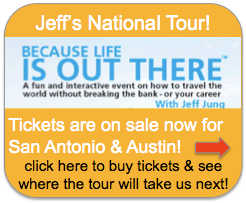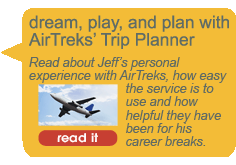I longingly looked at the Mombasa shore as we sailed off to the reef where we’d spent the afternoon snorkeling. I didn’t really want to be here. I wanted to be on the beach, simply relaxing and reading. However, I was talked into this snorkeling adventure because my friends said, “When will you ever get to go snorkeling in the Indian Ocean again?” It had taken me 36 years to see the Indian Ocean, so the thought of missing out on something while I was there was painful; and, apparently, persuasive.
Throughout the next months of my career break travel through Africa, I would have many more opportunities to experience the Indian Ocean, but I didn’t know that at the time. I was still operating under the idea I had to do everything I could in every destination; see everything the guidebook said I should see and socialize with everyone. I had to be “Super Travel Woman.”
Burnout is a very well understood term we use in the corporate world when we describe job stress; the concept of overwork to the point of apathy. For those who have spent years working in traditional jobs, these burnout tendencies are well-honed; so much so that they sort of become a part of how we operate. We multi-task everything squeezing the most possible out of our days/hours/minutes.
Doing Too Much – A Hard Habit to Break
Burnout on a career break; you probably think that’s impossible. After all, aren’t you away from work and traveling to places, doing things that you’ve always wanted to do? Yes, but after years of burnout in the corporate world, it’s hard to turn off the switch of ‘doing too much’. It takes time to realize that you don’t have to do everything.
As you start out on a career break, you go through decompression; you slowly turn your brain off the multi-tasking corporate mode and into the slower travel mode. People typically make some mis-steps along the way as you wean yourself off of the “I must do everything” habit. While in your first destination in Rome you may race around trying to see every site and go to every restaurant that your friends at home have recommended. Then you hop online and try to update everyone on your adventure. By the end of your time there you’ve ticked off all of the sites, you’ve gained 5 lbs, and you’ve successfully made everyone at home jealous,; now you’re off to Venice to do it all over again…but you’re exhausted. There was no downtime scheduled in your time in Rome. No time to just sit in a piazza and relax watching people and talking to locals.
Saving Yourself From You
How do we turn off those burnout tendencies which are our normal mode of operation when we start a career break?
1. Choose a limited number of sites you want to see from the guidebook.
2. Schedule time for nothing. (this will eventually become 2nd nature, and you won’t have to ‘schedule’ it!)
3. Don’t go online everyday trying to update everyone. Take a break from online devices. Schedule ‘internet days’ where you plan to be online for an afternoon doing updates and reading email.
4. Have a long, slow breakfast.
5. Read a book you’ve always wanted to read while sitting at a local café soaking up the slowness.
6 Keep your travel open–ended when possible. Make sure you understand cancellation/change policies on tickets in case you want to stay longer in a place and not stick to a rigid schedule.
7. Don’t confuse vacation with travel. Some people you meet will be on 2-week vacations, but you have much more time than that therefore you don’t have to try to do a 2-week site seeing schedule like other vacationers around you. You’re traveling – you’re not on vacation.
8. Don’t let tour-company peer pressure get to you. People trying to sell you a ‘tour’ to see the sites in one day don’t know the rest of your travel schedule, they simply want to book a trip. They ‘ll tell you the snorkeling in Mombasa is a ‘Must Do’ and you’ll see the most beautiful fish in the world. In my case, they didn’t know I was going to be at the Great Barrier Reef next month, or in Sinai snorkeling in 4 months. Trust your gut; don’t be sold something you don’t want to really do, but think you should do.
9. Don’t set an alarm – sleep in!
10. Tell yourself it’s ok to slow down, you aren’t on any deadlines any longer. No one is watching you, no one is conducting an annual review of your performance on your career break. Relax. Enjoy.
One of my favorite days I spent on my career break was when I decided NOT to go see the Temple in Luxor, Egypt. My friends were appalled I would skip such a thing. But I honestly wanted a day where I did nothing. I sat in an air conditioned McDonalds (I had been on the road over a year at that point – so forgive me for stopping at a McDonalds!), wrote in my journal, and had a hot fudge sundae. I would see other temples in Egypt, but that slow day was needed to allow all of my fabulous experiences to soak in.
About the author
Sherry Ott is a refugee from corporate IT who is now a long term traveler, blogger, and photographer. She’s a co-founder of Briefcase to Backpack, a website offering career break travel inspiration and advice. She also runs an around the world travel blog writing about her travel and expat adventures at Ottsworld — Travel and Life Experiences of a Corporate America Runaway.
If you like this post, sign up for our newsletter or subscribe to our RSS feed to keep up with Career Break Secrets’ career break and travel advice.
Tags: career break travel, travel advice











Sage advice. #7 made me laugh, I had friend visit me in Rio. Not only was he on a blitz vacation, but as an I-Banker we had different budgets. But the one I can’t stress enough #6. Keep An Open Schedule. It’s critical. So critical to everything.
Stay Adventurous,
Craig
Your article was most tweeted by National Geographic experts in the Twitterverse…
Come see other top popular articles surfaced by National Geographic experts!…
great list! although, i think these can be applied even if you ARE on a two week vacation.
[...] embrace it. Until you take a big trip yourself, you most likely will not believe the stories, but you will suffer from travel burnout at some point (probably several times). Life on the road is not always great. Constantly moving around, [...]